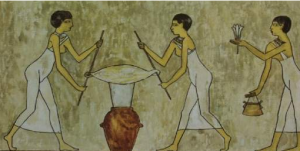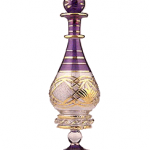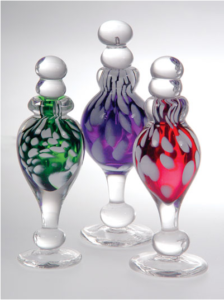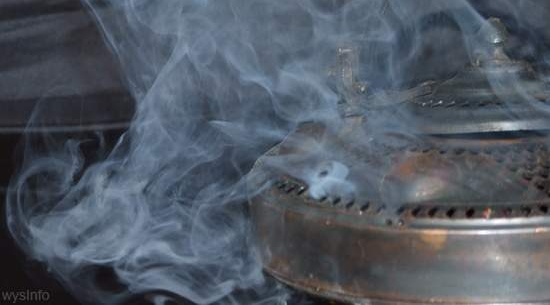 I’ve always loved perfume but not everyone feels that way. When I was a teenager, I used to pour on some of the perfume from my mother’s dresser before we went to a family event and my uncle, who was blinded in the war, used to bark when I walked in the door – ‘who’s wearing the perfume?’
I’ve always loved perfume but not everyone feels that way. When I was a teenager, I used to pour on some of the perfume from my mother’s dresser before we went to a family event and my uncle, who was blinded in the war, used to bark when I walked in the door – ‘who’s wearing the perfume?’
He never liked perfume to begin with and after he was blinded, his sense of smell may have become more acute. She was a fan of some of the heavier perfumes and like most women from that time, she had Chanel No. 5 in her collection, which remains a favorite to this day.
What many people may not realize is that men wore perfume in ancient times, where it was used, how and why. So, where does perfume hail from? The use of perfume and scent is mentioned as far back as the bible and in ancient manuscripts, with references to production sites in ancient Egypt, the land of Israel, India, Mesopotamia and in the Far East.
The importance that incense and perfume gained exceeded in many cases that of silver, gold, and precious stones. Yes, even for men. A lot of the plants and spices to make perfume were brought from the east: cinnamon from Ceylon and China; aloes from India, Spikenard – one of the more expensive perfumes plants – from Nepal and the Himalayas.
The first civilization to go on the record as using perfume regularly and with nuance was Egypt according to Ackerman’s Natural History of the Senses, a book dedicated to senses, of which, smell is the first chapter. Taken from her book about early Egyptian times, “their elaborate burial and embalming practices required spices and unguents. They burned tons of incense in elaborate worship rituals.”
Scent apparently also became an obsession during the reign of Queen Hatshepsut of the New Kingdom and this was B.C. (1558-1085).
 The Egyptians used massive quantities of perfume and incense in religious cults, anointed their bodies to ward off magical hexes, used it for medicinal reasons and of course, for reasons they do today – as beauty lotions. Many of the gorgeous and decadent bottles (not the ones in this article) came from the Egyptians who created glass vessels to display them and many Venetian glassmakers modeled their styles after the ancient Egyptians and Romans centuries later.
The Egyptians used massive quantities of perfume and incense in religious cults, anointed their bodies to ward off magical hexes, used it for medicinal reasons and of course, for reasons they do today – as beauty lotions. Many of the gorgeous and decadent bottles (not the ones in this article) came from the Egyptians who created glass vessels to display them and many Venetian glassmakers modeled their styles after the ancient Egyptians and Romans centuries later.
Alexander the Great was known to wear perfume and was a heavier user of incense, using saffron to soak his tunics. Ancient he-men were heavier perfume users as well, as a way to extend their territory so to speak.
In Ackerman’s Smell chapter, she notes that the pre-Greek culture of Crete used perfume and athletes anointed themselves with aromatic oils before the games. Additionally, “Greek writers around 400 B.C. recommended mint for the arms, thyme for the knees, cinnamon, rose or palm oil for the jaws and chest, almond oil for the hands and feet, and marjoram for the hair and eyebrows.
Egyptian men at a dinner party, would receive garlands of flowers and their choice of perfumes at the door. Flower petals would be scattered so they could make a fragrant stir when guests trod on them. Statues at these banquets often spurted scented water from their orifices. Before retiring, men would crush solid perfume until it was an oily powder and scatter if onto his bed so that he could absorb its scent while they slept.
Babylonian and Syrian men wore heavy makeup and jewelry, as well as laboriously arranged coiffures of tiny ringlets set with perfumed lotions. Apparently in ancient Rome, the passion reached such heights that both men and women took baths in perfume, soaked their clothes in it and perfumed their horses and household pets. The gladiators applied scented lotions everywhere before they fought.” 
Doesn’t this all sound heavenly? Leave it to the Christians to screw things up. Wearing of perfume died down for awhile with the rise of Christianity and their culture of constraint, guilt and being anti self-indulgent (oh please). John Trueman points out in The Romantic Story of Scent, “The men of the ancient world were clean and scented and the European men of the Dark Ages were dirty and unscented. Those of medieval times and of modern times up to about the end of the 17th century, were dirty and scented…….Nineteenth-century men were clean and unscented.”
 Damn puritans…..I’d love a culture that embraced oils and scents in my bed, on my floor and draped around the men in my world. I asked a friend of mine who spends half his time in Antarctica about the ratio of men to women there and then quickly added, “how often do men bathe up there?” It’s one of those ridiculous questions someone would ask if they’re clearly not familiar with a particular culture and Antarctica is most definitely, foreign to me. It’s the only continent I’ve never been to…..his response made me laugh. “There’s JUST enough women in Antarctica to make the men bathe and shave.”
Damn puritans…..I’d love a culture that embraced oils and scents in my bed, on my floor and draped around the men in my world. I asked a friend of mine who spends half his time in Antarctica about the ratio of men to women there and then quickly added, “how often do men bathe up there?” It’s one of those ridiculous questions someone would ask if they’re clearly not familiar with a particular culture and Antarctica is most definitely, foreign to me. It’s the only continent I’ve never been to…..his response made me laugh. “There’s JUST enough women in Antarctica to make the men bathe and shave.”
Bathing and shaving doesn’t mean that they adorn themselves with perfume but Antarctica too is about as foreign to northern African, Middle Eastern and the Mediterranean cultures who embraced perfume from early days.
The French were on board too. Louis XIV used to perfume his rooms with rose water and marjoram, wash his clothes in cloves, nutmeg, aloe, jasmine, orange water and musk and according to Ackerman’s research, he insisted that a new perfume be invented for him every day. CRIKEY! “At ‘The Perfumed Court’, of Louis XV, servants used to drench doves in different scents and release them at dinner parties, to weave a tapestry of aromas as they flew around the guests.”
While we wear perfume in today’s culture and the Puritans no longer get in the way, it isn’t embraced the way it was in ancient times. So many people are allergic to perfumes or have skin sensitivities because of all the added chemicals that come with modern scents, that the world of scent and fragrance isn’t quite as much fun as it was in ancient times. That said, there are plenty of original natural oils, from lavender and rosemary to sage and wintergreen that can not only perk up your nose but provide healing and relaxing benefits as well.
Like my mother, grandmother and great grandmother, all of whom I had the pleasure to experience, more than one bottle of perfume sits on my dresser and that tradition isn’t going to change anytime soon.
Photo credits in order: Wysinfo.com (first two), Ancient Roman Glass Bottles (courtesy of Israel Antiquity Authorities), RobbinsRanch Art Glass, ChessaleeinLondon

Renee Blodgett is the founder of We Blog the World. The site combines the magic of an online culture and travel magazine with a global blog network and has contributors from every continent in the world. Having lived in 10 countries and explored nearly 80, she is an avid traveler, and a lover, observer and participant in cultural diversity.
She is also the CEO and founder of Magic Sauce Media, a new media services consultancy focused on viral marketing, social media, branding, events and PR. For over 20 years, she has helped companies from 12 countries get traction in the market. Known for her global and organic approach to product and corporate launches, Renee practices what she pitches and as an active user of social media, she helps clients navigate digital waters from around the world. Renee has been blogging for over 16 years and regularly writes on her personal blog Down the Avenue, Huffington Post, BlogHer, We Blog the World and other sites. She was ranked #12 Social Media Influencer by Forbes Magazine and is listed as a new media influencer and game changer on various sites and books on the new media revolution. In 2013, she was listed as the 6th most influential woman in social media by Forbes Magazine on a Top 20 List.
Her passion for art, storytelling and photography led to the launch of Magic Sauce Photography, which is a visual extension of her writing, the result of which has led to producing six photo books: Galapagos Islands, London, South Africa, Rome, Urbanization and Ecuador.
Renee is also the co-founder of Traveling Geeks, an initiative that brings entrepreneurs, thought leaders, bloggers, creators, curators and influencers to other countries to share and learn from peers, governments, corporations, and the general public in order to educate, share, evaluate, and promote innovative technologies.









